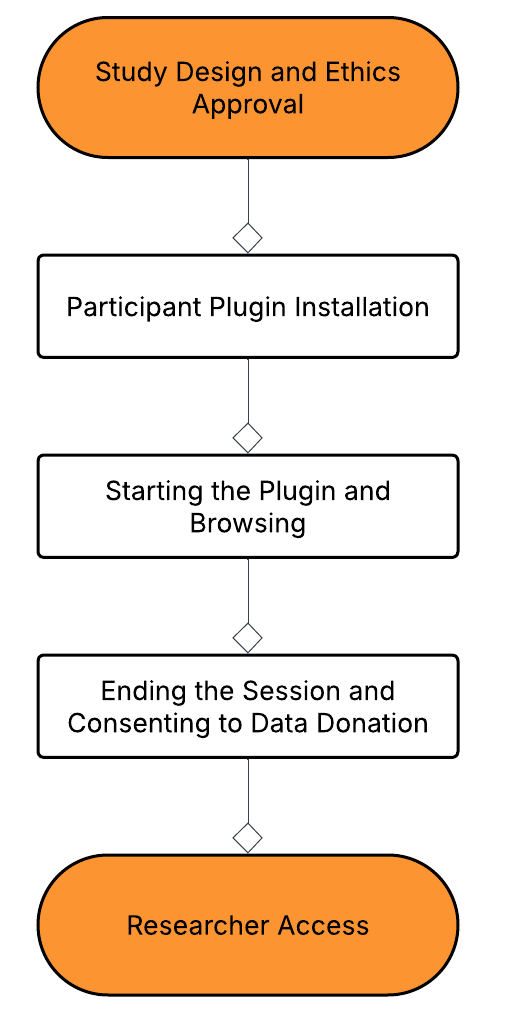Tools > Browser Plugins
Browser Plugins for Data Donation
Browser plugins offer a powerful and lightweight method for understanding how people experience the internet and what content they see. This tool allows consenting participants to share their activity on specific websites, giving researchers a direct window into personalised search results, targeted advertising, and curated content feeds on platforms like Facebook, Google, and YouTube.
It is a useful method for studying the desktop-based internet experience, capturing data ethically and in its native context. By observing what different people see when they perform the same actions, researchers can audit algorithms and uncover patterns that are invisible through other data collection techniques.
- Study Design and Ethics ApprovalA researcher designs their study, specifies the target websites and the exact content to be collected (e.g., ads, search results), and obtains ethics approval. They are then registered with the AIO system to manage participant enrolment and data access.
- Participant Plugin InstallationResearch participants are invited to install a lightweight plugin into their desktop web browser (e.g., Google Chrome). The installation is simple and guided.
- Starting the Plugin and BrowsingThe plugin runs quietly in the background once the user activates it. Using the underlying structure of the webpage, the tool identifies and captures the relevant content. For instance, it can recognise a Facebook post is an advertisement by identifying the "Sponsored" label.
- Data EnrichmentThe tool can do more than just capture what is on the screen. For example, when it collects a Facebook ad, it can also capture the ad's unique ID. This allows the system to automatically enrich the data by cross-referencing it with public resources like the Meta Ad Library to gather more information about the advertiser and their campaign.
- Ending the Session and ConsentingThe collected and enriched data is transferred to a secure research dashboard. The participant is then able to review all the data that has been collected and provide their final consent to share it with the researcher.
How do browser plugins work?
Why use browser plugins?
Browser plugins are specifically designed for studying the desktop internet, offering unique capabilities that complement mobile-based methods.
Algorithmic Auditing: The ability to perform automated, synchronised actions (like running the same search query) across a panel of participants is a powerful way to directly measure and compare algorithmic personalisation and bias.
Lightweight and Non-Intrusive: Unlike vision-based tools, browser plugins are lightweight and do not require significant computing resources, ensuring a smooth experience for the participant and less technical challenges.
Rich, Contextual Data: Data is captured within the platform's native environment, providing crucial context that is often lost when using APIs or other methods.
Automated Data Enrichment: By connecting captured content to public data repositories (e.g., Meta Ad Library), the tool provides a deeper, more comprehensive dataset for analysis.
What research can browser plugins support?
Browser plugins have been successfully used in projects to investigate the digital world from the user's perspective. The Australian Ad Observatory project, for example, uses this method to capture political and other targeted advertising seen by Australians on social media.
This tool is well-suited for research projects aiming to:
Investigate ad transparency by systematically collecting advertisements related to topics like elections, gambling, or public health.
Study the content of public groups or feeds on platforms like Facebook.
Monitor platform compliance with policies regarding content or advertising standards.
Contact Us
The browser plugin is a versatile tool for ethically accessing data on the desktop web. If you want to learn more about this method or have a project that can potentially benefit from this form of data donation, please contact us.

